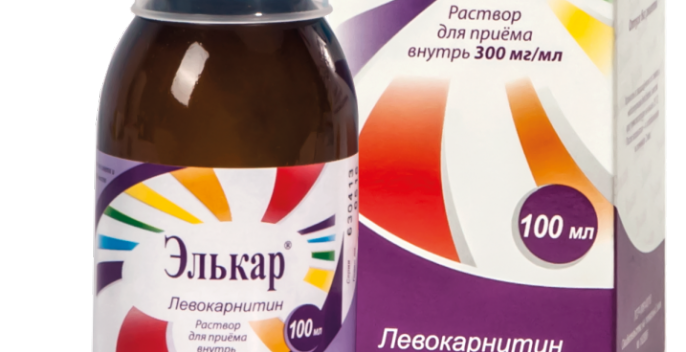Levocarnitine
Levocarnitine or L-carnitine is a natural substance that is essential for the human body. The drug is used in various fields of medicine and helps to cope with diseases. Therefore, in the article we will tell you all the advantages and disadvantages of the drug, as well as the methods of application.
Content
Why take levocarnitine
Only a doctor can prescribe treatment with levocarnitine. Now let's talk in more detail about the drug itself.
L-carnitine is a naturally occurring B vitamin that:
- takes part in the metabolic processes of the body;
- helps to improve protein and fat metabolism;
- helps to increase the production of gastric juice;
- helps to assimilate food;
- with intense exertion, it helps to reduce body fat faster;
- increases efficiency, etc.
In other words, levocarnitine is prescribed for chronic fatigue, heavy physical exertion, and rehabilitation.
How to take levocarnitine
The drug is recommended to be used together in complex therapy to achieve the best result. The main condition is the use of drops half an hour before meals, previously diluted with water.
Depending on the severity of the disease, the dose is prescribed by the doctor.
For adult patients:
- with severe physical and emotional stress, Dermatitis and eczema - half a measuring spoon 3 times a day;
- in case of anorexia nervosa, severe injuries, operations - 1 scoop 2 times a day;
- with diseases Gastrointestinal tract- 1/4 measuring spoon 2 times a day;
- for stroke, atherosclerosis, aneurysm, etc. - once a day 2.5 ml.
Treatment lasts from 3 weeks to 4 months, depending on the severity of the disease.
For children, drops are added to various compotes, tea or juice.
- For babies under 3 years old, the dose is determined by the doctor.
- Children from 3 to 6 years old take 5 drops 2-3 times a day.
- Children from 6 to 12 years old - 16 drops 3 times a day.
For babies, the course of treatment does not exceed 1 month.
Side effects of levocarnitine
For half a century of research, no severe side effects have been identified, even with excessive use of doses of the drug. In most cases, the treatment was calm and did not cause negative consequences.
Rare side effects have been reported:
The drug should not be used during hemodialysis procedures. Myasthenia gravis may occur.
To exclude sleepless nights, drops should be used in the morning. This is especially true for children with hyperactivity and encephalopathy.
Side effects can be avoided by observing the prescription dose.
Indications and contraindications for levocarnitine
The drug is used for the following diseases:
- Physiological and psycho-emotional stress.
- Stages of rehabilitation after operations, injuries or other serious illnesses.
- Supplement to the main therapy for gastrointestinal diseases.
- Violation of the skin - psoriasis, eczema, burns, lupus erythematosus.
- Neurological diseases with brain lesions.
- Anorexia nervosa.
- Natural deficiency of levocarnitine is myopathy.
- Feeding premature babies.
- Injury during childbirth or suffocation by the umbilical cord.
- Weak sucking reflex in babies.
- Low body weight.
- Poor muscle tone.
- Insufficient development of motor and mental functions.
The drug is contraindicated for pregnant and lactating mothers, as well as for people with liver and kidney diseases. It is prescribed with extreme caution in diseases of diabetes mellitus, peripheral vessels and hypertension.
Levocarnitine works well under conditions of strenuous work. Stresses are more easily tolerated, physical endurance increases. Athletes use the drug before competition to burn fat.
Levocarnitine products
What products contain levocarnitine, which is so useful and necessary for human life? Let's make a list of products by groups:
- Meat. Lamb is the record holder for L-carnitine content. Beef ranks second, followed by pork, rabbit and chicken. The principle applies here - the redder the meat, the more useful element it contains.
- Milk and dairy products. Most of all levocarnitine is found in hard cheeses and whole cow's milk.
- From fruit - avocado. Next come nuts and vegetables.
- Mushrooms.
- Fatty fish varieties - herring, sea bass, salmon, trout, etc.
Of course, you should not rush from extremes to extremes, and lean on only one type of product. Remember: everything should be in moderation. Since uncontrolled consumption of vitamin-rich foods can be harmful.
Levocarnitine: reviews
According to the reviews, it was concluded that people were divided into two camps "For" and "Against".
First, let's look at examples on babies. Many mothers were sure that children with low birth weight would have a hell of an appetite, but they were disappointed. The meaning of the drug is that muscle tissue grows not from the amount of food eaten, but from micro and macro elements that come with food. The result is achieved not from the first days, but after 1 month of use.
When recovering from surgeries or injuries, levocarnitine helps fractures heal faster and makes skin cells regenerate at an accelerated rate.
Also, the drug has proven itself in relation to skin diseases. People with psoriasis or eczema noticed first results after three weeks of use. Peeling of the skin has been noticeably reduced and itching... In complex treatment, levocarnitine helps fight these diseases.
Patients who are overweight have reported positive results when shedding pounds. The drug helps to quickly get rid of accumulated fat.
Athletes use levocarnitine to increase muscle mass. That is, the drug helps to get useful substances from food that contribute to muscle growth.
But there were also patients who did not notice any improvement after taking the drug. But perhaps this is a skeptical attitude or the wrong medication.
In any case, there should be an effect. The main thing is to follow all the doctor's recommendations and observe the dosage.







